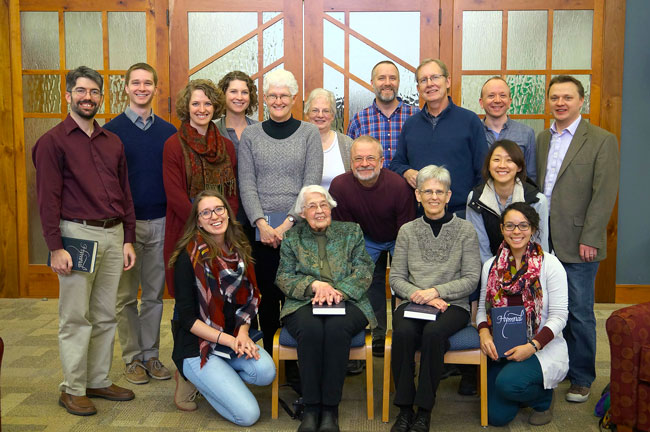The committee for the new Mennonite song collection had their second meeting in mid-February, and they’ve decided it’s time to let some baggage go by dropping the word “hymnal” from the song collection.
Herald Press is projected to publish the collection in 2020 for Mennonite Church USA and Mennonite Church Canada to replace “Hymnal: A Worship Book” (1992), “Sing the Journey” (2005) and “Sing the Story” (2007).However, in an attempt to include the increasingly diverse Mennonite church, this project will not be called a “hymnal” as has traditionally been the practice. Since hymnals are an integral part of the Mennonite culture for some members of the church, this shift away from tradition will likely leave some uneasy.
Bradley Kauffman, a former music instructor at Hesston College, Bethany Christian Schools and Iowa Mennonite School, is the project director and general editor of the song collection.
“We wanted, at the beginning of our work, to remove as much as we could that felt like baggage, that limited our view of our work,” he said. “We’re aware that hymnals are cultural and there’s a segment of the church that has very positive associations with the hymnal and there are other segments of the church that have a very different experience-it feels like hymnals can delineate who is outside and who’s inside.”
As the Mennonite Church becomes increasingly attentive to diversity within the church, specifically diversity of worship styles, perhaps a book like this comes at a good time.
“The word ‘hymn’ is sometimes understood narrowly,” says Kauffman. “It is thought to be something tired… the stereotype is too many verses, all the same, kind of boring.”
And that’s coming from a self-proclaimed “lover of hymns.”
But instead of focusing on the omission of the word “hymnal” the committee is focusing on the positive potential for this new book. By using the phrase “song collection,” at least informally at this point, the committee now has the freedom to include songs beyond those in the traditional Mennonite European canon (though many favorite hymns will be included as well).
Kauffman says, “We’re invested in finding as many recent voices as we can, in whatever stylistic format, in whatever idiom. You know, contemporary hymn writers, contemporary songwriters, contemporary perspectives, folks producing content in a variety of approaches.”
While the most recent blue 1992 Hymnal focused on stretching the theological and cultural boundaries of the previous 1969 Hymnal by including music from a variety of cultures (particularly songs from the continent of Africa, introduced to Mennonites by Mary Oyer, hymnologist and Goshen College professor emeritus), as well as introducing less gendered language, this song collection will stretch boundaries by providing a representative example of the diverse ways that North American Mennonites worship.
Oyer, a woman very well versed in the history and depth of the word “hymnal” reflects, “I like the word ‘hymnal’ because it’s broad. It’s old but continues to incorporate changing styles in language and music throughout history. And that I’d like to see carried on unless they find a word or phrase as inclusive as “hymnal.”
Lest traditionalists worry that the change in name will mean a significantly different book, Kauffman offers some solace.
“I don’t think people are going to open this book and say, ‘Oh, the hymns are all gone,’” says Kauffman. “We will care for retaining favorites and things that have held a lot of meaning over the past decades.” An estimated 50 percent of songs in the new collection will be comprised of material from HWB, STJ and STS.
Both Kauffman and Oyer are confident that the planning committee will retain songs that still seem relevant as well as introducing newly composed favorites to the church.
“I like very much what that hymn committee is doing,” says Oyer, “and their preparation…these people have done work with people, with hymnals, they’ve done studies… they’ve worked in the church with hymns. That’s a good sign.”
And in terms of naming the song collection (which is still in process), Kauffman isn’t worried.
“I have a lot of confidence in the group that’s working on this to come up with a title that evokes what we want to do with this collection,” he says. “That hasn’t come into focus yet.”
The new Mennonite song collection will represent the ways that worship evolves and changes, but the committee recognizes that change is not always an easy thing.
Kauffman and the committee are aware that whatever decisions they make, some will be disappointed. With this in mind, they hope to create a book that serves most of the church well, and challenges the church as a whole.
Correction: The book itself hasn’t been named yet. The song committee doesn’t have the term “hymnal” in their description of themselves. (April 12)

